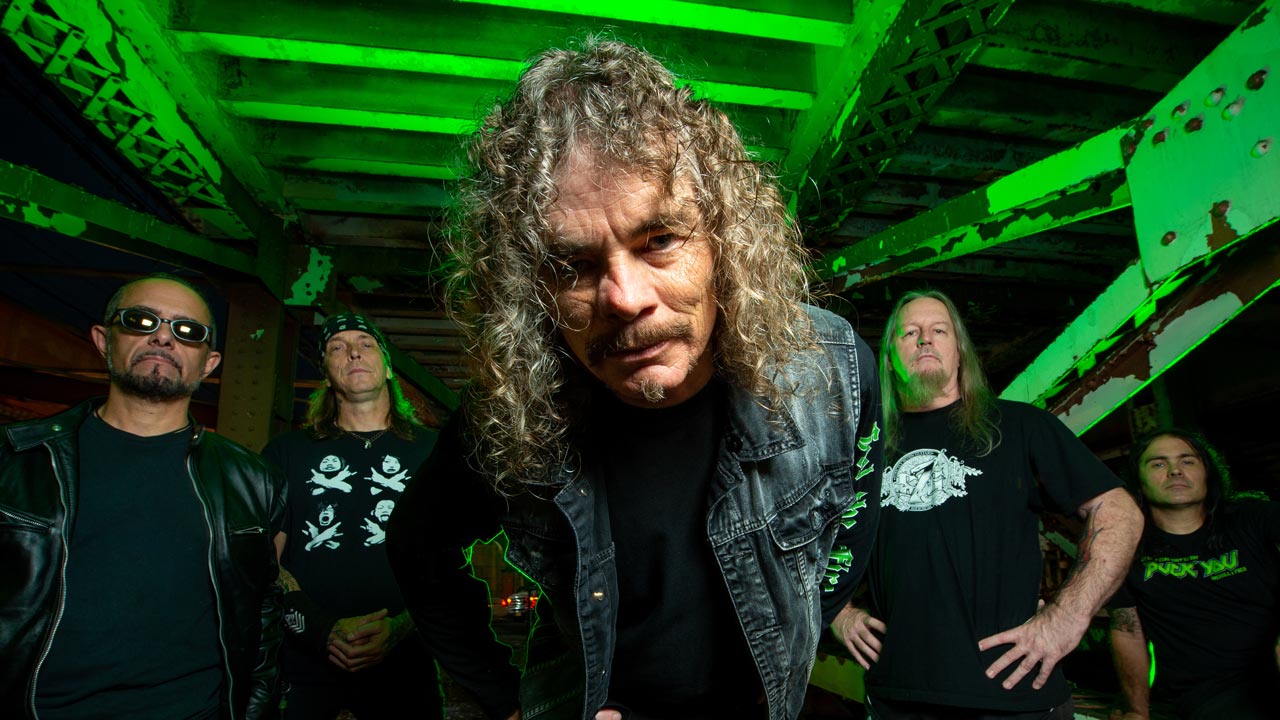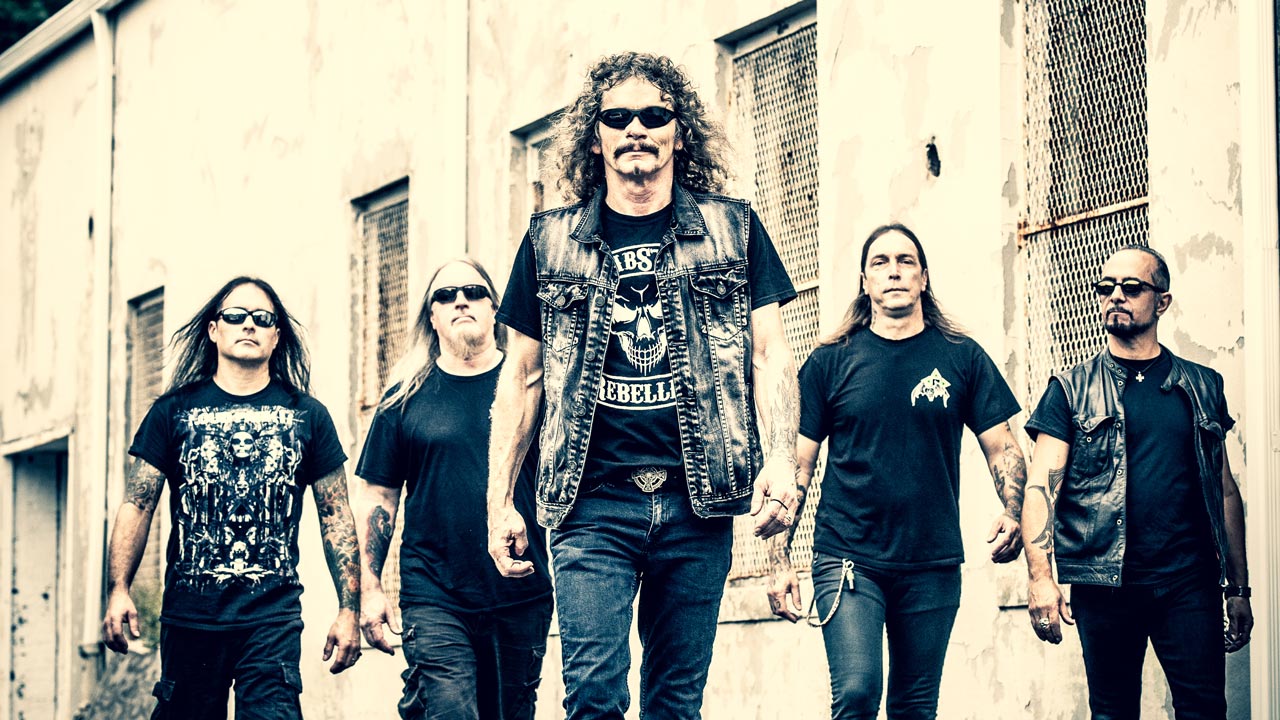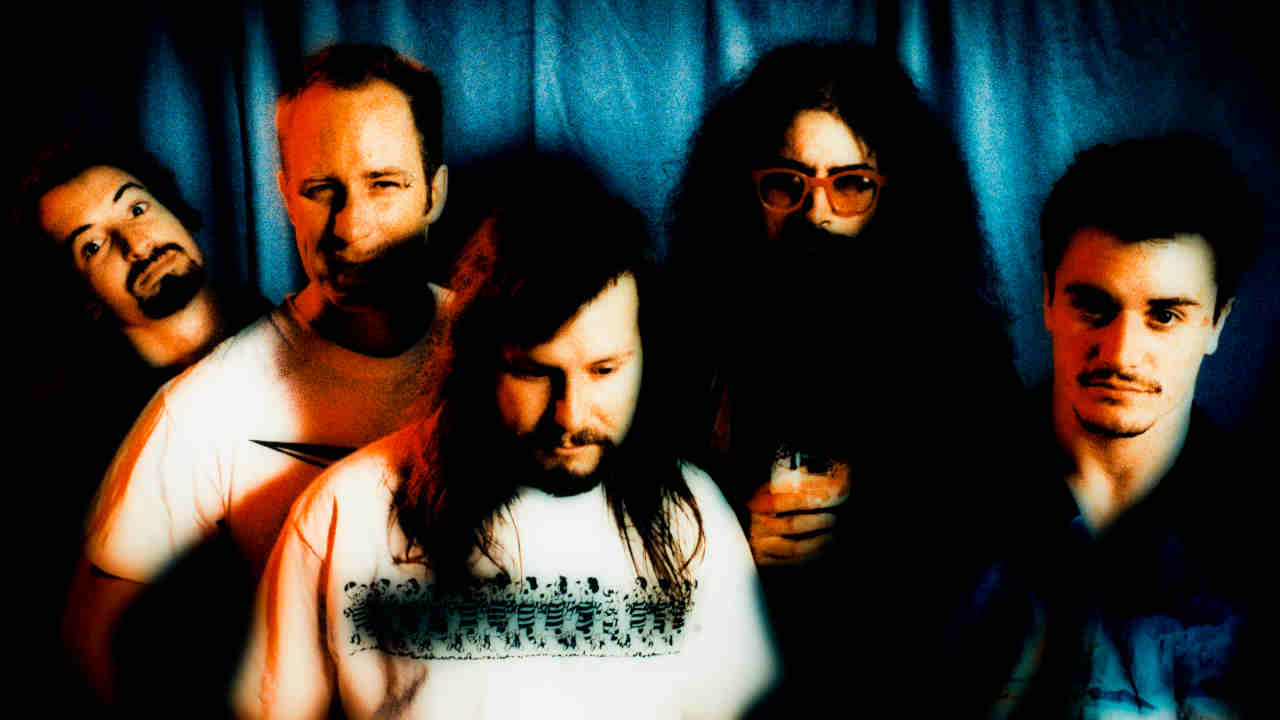Overkill’s Bobby ‘Blitz’ Ellsworth: My Life Story
Thrash metal icon. Party monster. Cancer survivor. Overkill frontman Bobby ‘Blitz’ Ellsworth has done it all and lived to tell the tale

Bobby 'Blitz’ Ellsworth has the best laugh you’ll ever hear. This infectious madman’s cackle explodes out of nowhere and promptly rips your eardrums shreds. You've barely had time to recover when the next one arrives.
But then the Overkill frontman has a lot to laugh about. His band’s 19th album, Wings Of War, keeps up their late career hot-streak. A fixture of the East Coast thrash scene since before thrash was even a thing, Overkill have weathered everything the music industry – and life – has thrown at them. There have been the commercial highs of the late 80s and the grunge-induced lows of the 90s. Blitz himself has battled through a set of various health problems that would have felled a lesser person, yet he remains as indefatigably upbeat, optimistic and dedicated to the band he founded back in 1981.
“Ya can’t let things get ya down,” he says, before unleashing the first of many cackles: “Plus what else am I gonna do?”

How are things with you right now, Blitz?
It's snowing, my car battery's dead, I think I had bad fish for lunch. [Cackles] Nah, I'm fine.
Wings Of War is Overkill’s 19th album. How do you keep it up?
It’s because we're selfish bastards - the guys with the most records wins! Nah, it's something we've always loved. We never found ourselves wandering around into walls with an identity crisis. It’s always given us the opportunity for fresh ideas, if we know what we are. It's not about mailing things in or wondering what we were. It's about conforming what we are.
Sign up below to get the latest from Metal Hammer, plus exclusive special offers, direct to your inbox!
Former Shadows Fall drummer Jason Bittner plays on this album. Was he a fan before he joined?
He comes from Albany in upstate New York and he would show up at every Overkill show in Albany with two fucking sticks in his back pocket. I never knew the kid's name - I used to call him Sticks. And I said to him one day, you're waiting for Tim Mallare [Overkill drummer from 1993-2005] to drop dead onstage so you can throw in. And he said to me, ‘I'm ready.’ So yeah, he's a fan.
We’re living in a crazy world right now. How much of that influences what you’re writing about?
We're the last cowboys here. We came from a different era. The world is crazy is because our information is instantaneous. Back in the 80s and 90s, there was time between the act and when it got to you, and in the interim the truth was found. I remember my father telling me, ‘Whatever you do, think about it first.’ People have forgotten that. The song Batshit Crazy is about that – where did all the common sense go?
You grew up in New Jersey. What that like?
I was a suburban kid, like most metal kids are in the US. Me and DD both had professional fathers. My grandparents were immigrants, so were DD's. New Jersey has always been second to New York. There are five boroughs in New York - they call Jersey ‘The Dirty Six’. The point being is that we built their bridges and their towers, we picked up their garbage. There's a hell of a work ethic in that.
Did being across the water from New York give you an inferiority complex?
More like a fucking chip on your shoulder! It was, like, ‘Come over here and say that!’ Seventy per cent of Manhattanites are nowhere near Manhattan when they grow up - they just go there cos that's where the money is. But the people in Jersey had a great work ethic and a hell of an attitude. It's the most attitude-fuelled place I've ever seen in my life, and I'm used to it. But some great music has come out of Jersey: Bruce Springsteen, Bon Jovi, the Skid Row guys. Frank Sinatra for fuck's sake. It sure produces honest representation in music.
Who made you want to be a musician?
The first voice I remember hearing was my mother's - she was a soprano. Still is for that matter. She had 12 brothers and sisters. Our family Sundays were them singing harmonies around the fireplace, so it was a natural thing for me. When it came to metal, I always thought the benchmark was and still is Mr Halford. It was just the most unique presentation to vocals, and it's something that has stayed with me for all these years.
You’ve got a hell of a scream. When did you realise you could do that?
It was sitting on the beach in a bathing suit and I dropped a cigarette on my lap! Nah! I just started trying it at rehearsals. I was originally trying to mimic Rob Halford. The benchmark for a singer back in the early 80s was, could you do Priest's Green Manalishi, and I could do it. It become kind of my trademark, and it's never left me - it became something I could use for effect here and there throughout my career.
You started in 1981, a couple years before thrash arrived. How did that change things for you?
We obviously noticed the energy. We’d been coming along at the same time, and we were much more into the punk rock end of things and fusing it with traditional British metal. We were Misfits fans, we were Dead Boys fans, we were Ramones fans. But you start doing some Priest covers with that and you start creating a third entity.
The beauty of it was there was no template. It was being created in San Francisco, and in Essen, Germany and in the UK and in New Jersey - we didn't have that instant information, so it was kind of hard to steal it from each other. The beauty was that it developed slightly differently in all those places and many others, without the comfort or the technology we have today.
Was there camaraderie between you and bands like Anthrax and Metallica, or was it more of a rivalry?
I think it was competitive. We knew the Anthrax guys, but we never really hung out with them. They were hanging out with Metallica. And sometimes Metallica would come down and hang out with us too, but it never seemed like the three of us were in the same room.
You were a fixture at the legendary club L’Amour in Brooklyn…
Fuck man, we were the house band there. We were actually managed by two of the owners back then, We were a totally self-promoted band – we'd wear out our Converse putting flyers into windshield wipers, and we would constantly go to these two guys and give them packages.
I remember it being my turn, and I walked up one of them, and he goes, Listen kid, I got 40 of your fucking packages on my desk, you're a nice kid, but your band sucks. A fucking year later we were the house band in the place, because money talks and bullshit walks. And these guys recognised that.
What was a typical there gig like?
Oh god, man. They had a legal capacity of about 1200 people at L'Amour in Brooklyn, and an average Overkill show would hold approximately 1750. An average Metallica show would hold 2200. It was fucking insane, It was dick-to-ass all the way to the back of the room but the whole thing just pulsed. You could see people moving in completely directions in total unison. It was off the hook.
What were the levels of violence like?
There was always fights, but I don’t think they were necessarily based on the music. I remember when the hardcore scene and the metal scene got fused together, there was little bit of a time of unrest, but it never happened between bands. You would get X amount of hardcore guys in Doc Martins, and X amount of metalheads in Motörhead shirts, and nobody wanted to give an inch. But as time went in, it did fuse together
I remember getting into a fist-fight myself on the street with a couple of guys one night. I wasn't gonna back off. And besides, I was only 150 feet from the front of the club that managed me, and everybody in the place knew me. If I was gonna have big balls, that was the situation to have ’em.
How do you look back on your first two albums, Taking Over and Feel The Fire?
Oh, I’m very proud. I love being able to go back - it's almost like having a snapshot of your life. There's some brilliant young man angst on those records. I was torn between two or three things - I was a university student down in the city, I was writing lyrics for Overkill, and I was a huge fan of the punk scene. So when I hear Feel The Fire, I hear all that. I hear my literary courses I was taking, stealing stuff right out of Shakespeare in there. I hear the punk that I would see down at Max's. And I hear the desire to be a songwriter.
You released the infamous Fuck You mini-album in 1987 with an upraised middle finger on the cover. That title was a hell of a statement back then…
It was our only political statement. [Democratic senator and future Presidential candidate] Al Gore and his wife Tippa created the PMRC, and it was all over the news that records were going to be stickered and banned. It could have been called 'Ban This'. Most stores sold it in black-wrapped covers or in craft paper. Some retail outlets had the nuts just to put it out. It was young men to waving the flag of their own freedoms.
If someone had walked on the Overkill tourbus back in those days, what sort of scenes would they have walked into?
We had our fun, let's just say that. I used to walk in a venue with a beer in each hand, with a hard-on and looking for a fight. Now I have a cup of coffee and I’m looking for a clean toilet.
You hit a hot streak with 1989’s The Years Of Decay and 1991’s Horrorscope. What do you remember about that period?
We knew we were different, and we thought of that as a good thing. We weren’t being lumped into the whole scene as we developed. [1988’s Under The Influence] disappointed me a little bit. But by The Years Of Decay, it came to fruition - we became a purely identifiable thing. With the Horrorscope record, we added a touch of groove to our approach, and I think that’s when we became full-grown.
The 90s was a tough time for a lot of thrash bands. How was it for Overkill?
The 90s is one of the proudest eras of Overkill. It’s when we got the hair on our balls. One day, there was 200 thrash fans in a room sharing a draft beer, the next day there was eight. And we happened to be four of them. We thought to ourselves, ‘If we want to do this, have to retool this fucking thing or just go home live in our parents' basements and wonder why nobody appreciates our fucking genius.’
We took our management over, continued to tour. I got sober, I had to have a clear head to deal with it. But we got it done. I look at it as separating the men from the boys. It made us what we are today.
You were diagnosed with cancer of the nose in 1998. How did that affect you?
Well, I was sober by that time so I had a clear head to deal with it. I used to ride in this bike club, and I remember sitting with this guy who had a lot more years in the club than me. He goes, ‘There are two sides to every fucking problem. It’s just about getting through it that sucks.’ I never looked back after getting that advice, cos it was as simple as shit. I was complicating all this stuff in my head.
I came in to do the first show with my face all bandaged up. They'd just removed some of 'em so I could sing, and I was all swollen black and blue. I said, ‘Somebody get a picture - we're putting it on the cover of the live record and we're calling it, You should see the other guy.’
A few years later, you had a stroke onstage. What did that feel like?
Well, the light went off. I thought it was a power failure! It’s something I have a genetic disposition to. My mother has it. My pop would say, ‘Oh, mommy’s having an episode’, to not scare the kids. So I had the ‘episode’, and I did more damage falling down the stairs off the stage than the stroke had done to me. I was on my motorcycle in fucking two weeks. Mind you, I could only make left turn [cackles]. It took me four hours to get home!
Cancer, a stroke, you had pneumonia a few years ago. Do you ever think that being in a metal band isn’t good for your health?
Nah, I never think that. This is the human condition - we're fragile. Go out with a fucking smile on your face and your heart racing, not clinging on to it like grim death.

You and bassist DD Verni have both been in the band since the start. What’s your secret?
We had the same upbringing, we understand each other. His wife said to me one day, ‘The only reason it works is that you're the same people. You do the same things.’ We're not playing pool with each other on Friday nights when the band's not together, but for sure, we have the same principles. If we’re OK, the band takes care of itself. The band's the easy part. Life is the hard part. So let's take care of life so we can do whatever the fuck we want. And I think that's why it works
The longest break you’ve had between albums is three years. Mostly it’s just one or two years. Do you ever fancy a holiday?
Nah. We're happy with our tools on,. It’s like a middle-aged boys club - after the work is done and the set-up for all of it, it becomes a vacation. There’s five guys rolling dice, taking each others' money, lighting cigars.
Do you ever look at Metallica and Slayer and think, ‘Why aren’t we as big as those guys’?
Nah, that would ruin it for me. I'd rather count my success in terms of opportunities and the days I have, not what Tom and Kerry are doing.
Do you ever see a day when you retire?
Only if I can't enjoy it. I’m an adrenaline junkie. This is thing that’s kept me going all this time. It's the high I chase. If I can't do it at a high level, sure, that makes sense. But at this point, it hasn’t crept in yet.
Dave Everley has been writing about and occasionally humming along to music since the early 90s. During that time, he has been Deputy Editor on Kerrang! and Classic Rock, Associate Editor on Q magazine and staff writer/tea boy on Raw, not necessarily in that order. He has written for Metal Hammer, Louder, Prog, the Observer, Select, Mojo, the Evening Standard and the totally legendary Ultrakill. He is still waiting for Billy Gibbons to send him a bottle of hot sauce he was promised several years ago.

